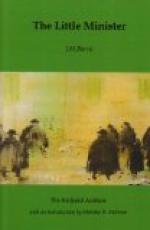“And since that day,” said Hobart, “Rob has worshipped Mr. Dishart as a man that has stepped out o’ the Bible. When the carriage passed this day we was discussing the minister, and Sam’l Dickie wasna sure but what Mr. Dishart wore his hat rather far back on his head. You should have seen Rob. ‘My certie,’ he roars, ’there’s the shine frae Heaven on that little minister’s face, and them as says there’s no has me to fecht.’”
“Ay, weel,” said the U. P., rising, “we’ll see how Rob wears—and how your minister wears too. I wouldna like to sit in a kirk whaur they daurna sing a paraphrase.”
“The Psalms of David,” retorted Whamond, “mount straight to heaven, but your paraphrases sticks to the ceiling o’ the kirk.”
“You’re a bigoted set, Tammas Whamond, but I tell you this, and it’s my last words to you the nicht, the day’ll come when you’ll hae Mr. Duthie, ay, and even the U. P. minister, preaching in the Auld Licht kirk.”
“And let this be my last words to you,” replied the precentor, furiously; “that rather than see a U. P. preaching in the Auld Licht kirk I would burn in hell fire for ever!”
This gossip increased Gavin’s knowledge of the grim men with whom he had now to deal. But as he sat beside Margaret after she had gone to bed, their talk was pleasant.
“You remember, mother,” Gavin said, “how I almost prayed for the manse that was to give you an egg every morning. I have been telling Jean never to forget the egg.”
“Ah, Gavin, things have come about so much as we wanted that I’m a kind o’ troubled. It’s hardly natural, and I hope nothing terrible is to happen now.”
Gavin arranged her pillows as she liked them, and when he next stole into the room in his stocking soles to look at her, he thought she was asleep. But she was not. I dare say she saw at that moment Gavin in his first frock, and Gavin in knickerbockers, and Gavin as he used to walk into the Glasgow room from college, all still as real to her as the Gavin who had a kirk.
The little minister took away the lamp to his own room, shaking his fist at himself for allowing his mother’s door to creak. He pulled up his blind. The town lay as still as salt. But a steady light showed in the south, and on pressing his face against the window he saw another in the west. Mr. Carfrae’s words about the night-watch came back to him. Perhaps it had been on such a silent night as this that the soldiers marched into Thrums. Would they come again?




